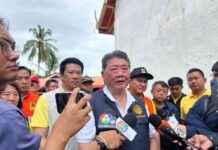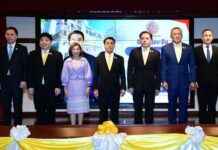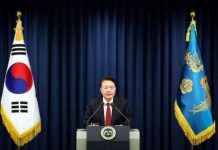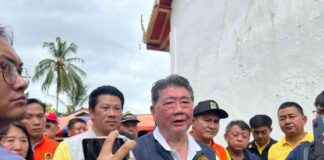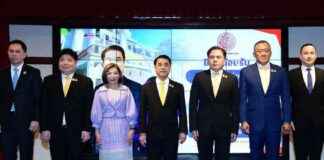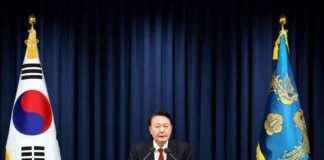Hungary, currently holding the presidency of the Council of the European Union, is set to engage in discussions regarding three Asean-EU free trade agreements (FTAs) in the upcoming months. The Hungarian Ambassador to Thailand, Sandor Sipos, disclosed this information during a jazz concert held at the Peninsula Bangkok Hotel to celebrate Hungary’s EU presidency, which spans from July 1 to December 31 of this year.
During his address at the event, Ambassador Sipos emphasized the significance of Hungary’s role in strengthening relations between Asean countries and Europe. He highlighted the upcoming negotiations for three free trade agreements with Asean nations, including a crucial FTA negotiation round with Thailand scheduled for November. Both Thailand and Hungary are known for their export-driven economies, making trade relations between the two countries a key priority during Hungary’s EU presidency.
Ambassador Sipos reiterated Hungary’s commitment to enhancing trade ties with the region during its term as EU president. He expressed the intention to build upon the groundwork laid by the previous presidency and foster closer bonds between the European Union and Thailand. The Ambassador emphasized the importance of mutual respect and appreciation for each other’s values and traditions in strengthening the relationship between Hungary and Thailand.
As Hungary prepares to hand over the EU presidency to Poland next year, the country’s agenda remains focused on key themes outlined by the EU. These themes include bolstering the EU’s competitiveness, reinforcing defense policies, addressing challenges related to illegal migration, advocating for an EU agricultural policy that benefits farmers, and tackling demographic issues within the European Union.
Hungary’s Strategic Approach to Trade Agreements
Hungary’s proactive stance on trade agreements reflects its strategic approach to enhancing economic cooperation with international partners. By actively engaging in discussions regarding free trade agreements with Asean countries, Hungary aims to leverage its EU presidency to foster mutually beneficial trade relations. The upcoming negotiations with Thailand and other Asean nations underscore Hungary’s commitment to promoting trade liberalization and economic growth in the region.
Ambassador Sipos’ announcement of the upcoming FTA negotiation round with Thailand in November signals Hungary’s dedication to deepening trade ties with one of Asia’s key economies. As both Hungary and Thailand share a focus on exports, the prospect of a free trade agreement holds significant potential for expanding market access and boosting trade volumes between the two countries. Hungary’s emphasis on continuity in its trade policy indicates a long-term vision for strengthening economic cooperation with Thailand and other Asean partners.
Hungary’s Role in Strengthening EU-Asean Relations
Hungary’s presidency of the EU provides a unique opportunity to enhance the partnership between the European Union and Asean countries. By prioritizing trade agreements and economic cooperation with Asean nations, Hungary aims to deepen the integration of these regions and promote shared prosperity. The upcoming discussions on FTAs with Asean countries underscore Hungary’s commitment to fostering closer ties with Asia and expanding market opportunities for European businesses.
Ambassador Sipos’ emphasis on building stronger relations with Thailand and other Asean nations reflects Hungary’s proactive approach to diplomacy and economic engagement. By prioritizing trade negotiations and economic cooperation, Hungary seeks to strengthen its position as a key player in promoting trade liberalization and market access for European businesses. The upcoming FTA negotiation round with Thailand in November presents a significant opportunity for Hungary to showcase its commitment to fostering economic growth and enhancing trade relations with key partners in the region.
Hungary’s Focus on Key EU Themes
As Hungary assumes the presidency of the European Union, the country has outlined key themes that will guide its agenda during its term. By focusing on enhancing the EU’s competitiveness, reinforcing defense policies, addressing migration challenges, advocating for farmer-oriented agricultural policies, and tackling demographic issues, Hungary aims to address pressing issues facing the European Union. The country’s strategic approach to these themes reflects its commitment to promoting sustainable growth, security, and prosperity within the EU.
Hungary’s emphasis on competitiveness and defense policy underscores the importance of strengthening the EU’s position in the global economy and enhancing its security capabilities. By addressing challenges related to illegal migration and promoting farmer-oriented agricultural policies, Hungary demonstrates its commitment to supporting sustainable development and addressing key issues affecting European communities. The country’s focus on demographic challenges highlights the importance of addressing population trends and promoting inclusive growth strategies within the EU.
In conclusion, Hungary’s presidency of the European Union presents a unique opportunity to advance trade agreements, strengthen EU-Asean relations, and address key themes impacting the European Union. By prioritizing economic cooperation with Asean countries, Hungary aims to promote trade liberalization, expand market access, and foster shared prosperity. The upcoming negotiations with Thailand and other Asean nations underscore Hungary’s commitment to enhancing economic ties with key partners in the region. As Hungary navigates the challenges and opportunities of its EU presidency, the country’s strategic approach to trade agreements and key EU themes will shape its agenda and contribute to the advancement of economic cooperation and regional integration.




